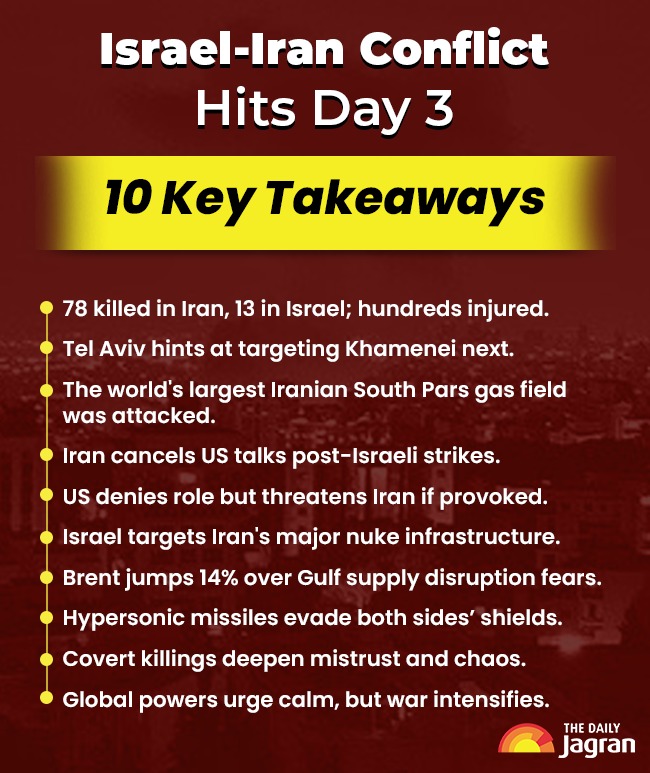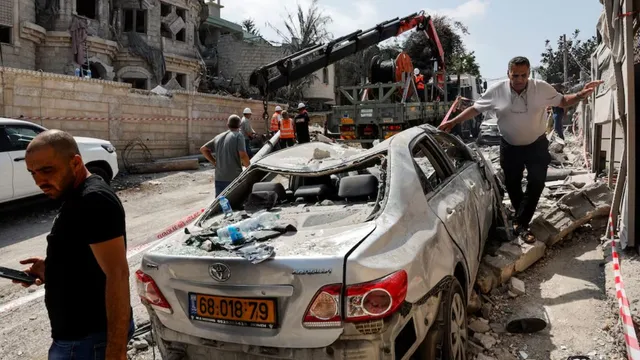- By Supratik Das
- Sun, 15 Jun 2025 02:45 PM (IST)
- Source:JND
The Israel-Iran war escalated into its third and most volatile day on Sunday, with Israel launching a new wave of airstrikes deep into Iranian territory that hit nuclear and energy infrastructure. With Iran threatening a fierce retaliation and nuclear talks now cancelled, the crisis has intensified, threatening international energy security and bringing the region closer to all-out war. Iran confirmed that Israeli attacks hit several key military and nuclear facilities, including the Isfahan uranium conversion plant and Natanz enrichment plant power systems. Israeli cities, such as Tel Aviv and Rehovot, meanwhile, saw renewed missile bombardments from Iran. Israel also issued an evacuation warning to Iranians residing near reactors, an Israeli military spokesperson said in a post on X. The conflict has already shaken world oil markets, with both energy infrastructure and shipping routes in the Gulf seemingly in the crosshairs.
Top 10 Developments in the Israel-Iran Conflict: Nuclear Talks Off, Energy Sites Targeted
1. Nuclear Talks Collapse Amid Military Escalation
Planned nuclear negotiations between Iran and the United States in Oman were scrapped following Israel’s strikes on Iran’s nuclear facilities. Iranian foreign minister Abbas Araghchi said talks were now “meaningless”, blaming the US for enabling Israeli aggression.
2. Strikes Hit Natanz and Isfahan Nuclear Sites
Israeli fighter jets attacked the Natanz nuclear facility, destroying key power structures, and a follow-up wave of missiles destroyed four key buildings in the Isfahan uranium conversion plant. The attacks at the nuclear site may also result in "radioactive and chemical contamination" at the massive desert region, the UN nuclear watchdog IAEA stated.
3. South Pars Gas Field Hit, Gas Production Stopped
Israel also attacked Phase 14 of the world's largest Iran's South Pars gas field, setting it on fire and forcing the shutdown of 12 million cubic metres of gas production per day. South Pars, while mostly used domestically, is located in a geopolitically exposed corner of the Persian Gulf. “This is the most important energy infrastructure strike since Abqaiq in 2019,” said Jorge Leon at Rystad Energy, cautioning that restoring operations back could take several months. With sanctions and aging infrastructure already straining Iran’s grid, the blow may cause prolonged power cuts and 250 USD million daily losses to the economy, as per the Iran Chamber of Commerce.

4. Death Toll Rises In Iran and Israel
Iran's ambassador to the UN reported 78 fatalities and more than 320 injuries in the attacks. In Israel, 13 have been killed to date, two of them children, with more than 200 hurt across several cities. Iranian missiles struck Bat Yam, Tamra, and Rehovot, resulting in extensive damage and panic.
5. Oil Prices Soar, Market On The Edge
World oil prices jumped 14 per cent, closing at about 73 USD per barrel, as markets responded to the threat against Gulf energy infrastructure and shipping channels. With the Strait of Hormuz, through which 14 million barrels of oil and 21 per cent of LNG are shipped every day, possibly becoming a target, supply fears have risen throughout Asia and Europe.
6. US Distant Itself But Warns Iran
President Donald Trump wrote on Truth Social that the US had not been involved in the Israeli operations. He also warned Iran against launching an attack on the United States “in any way or form", would prompt the country’s armed forces to “come down on you at levels never seen before". Trump also claimed that he can “easily" get a deal finalised between Iran and Israel. “The US had nothing to do with the attack on Iran tonight. If we are attacked in any way, shape, or form by Iran, the full strength and might of the U.S. Armed Forces will come down on you at levels never seen before. However, we can easily get a deal done between Iran and Israel, and end this bloody conflict," Trump posted on Truth Social.
ALSO READ: Is Ayatollah Khamenei Next Target? Israel's Warning Sparks Fears For Iran
7. Israel Warns of Bigger Offensive
Prime Minister Benjamin Netanyahu declared Israel's ongoing operations were "only a fraction" of what’s to come if Iran continues to attack civilians. The Israeli army asserted that it had "penetrated Iran's command levels" and possessed accurate information regarding Iran's nuclear and military installations. The first strikes were said to have killed multiple top Iranian officials, including IRGC chief Hossein Salami, Armed Forces chief Mohammad Bagheri, and veteran diplomat‑general Ali Shamkhani, among others. Even on Sunday in a significant and provocative comment, the Israeli official said the possibility of assassinating Iran's top leader, Ayatollah Ali Khamenei, is "not off limits."
8. Iron Dome vs Iran's Air Defence
Israel's Iron Dome and David's Sling missile defense systems intercepted numerous projectiles but were unable to intercept some of the incoming missiles that struck high-density urban areas. Similarly, Iranian facilities such as South Pars and Natanz, typically shielded by developed air defence units, were engulfed by the extent and velocity of hypersonic ballistic attacks.
9. Drone and Stealth Operations Increase Strife
Reports of Israeli air strikes on gas plants and even clandestine attacks killing nuclear scientists and generals indicate a secret war occurring simultaneously with overt hostilities. Iranian authorities in private voiced astonishment at how far Israel has penetrated key facilities. Though Iran was well aware of the preparations being carried out by Israel for a possible attack on Tehran’s nuclear facilities, it did not expect Jerusalem to strike while the negotiations with the US regarding the nuclear programme were still underway.
ALSO READ: Iran Really Shot Down F-35? Mystery Of Stealth Jet Sparks Global Debate | Here's Why It Was Special
India, China, the EU, and the UN made strong appeals for de-escalation, labeling the attack on nuclear and energy infrastructure as a "dangerous precedent." But both Israel and Iran indicated they will not back down.
The breakdown of diplomatic negotiations and the attack on high-value energy assets have dangerously expanded the conflict's reach. Now, if Kharg Island (Iran's oil export terminal) or the Strait of Hormuz is attacked, the aftershocks could ignite a global energy crisis and inflation spike.
Israel-Iran War: Nuclear Talks Collapse, Israeli Airstrikes Hit World's Largest Gas Field | 10 Key Developments

